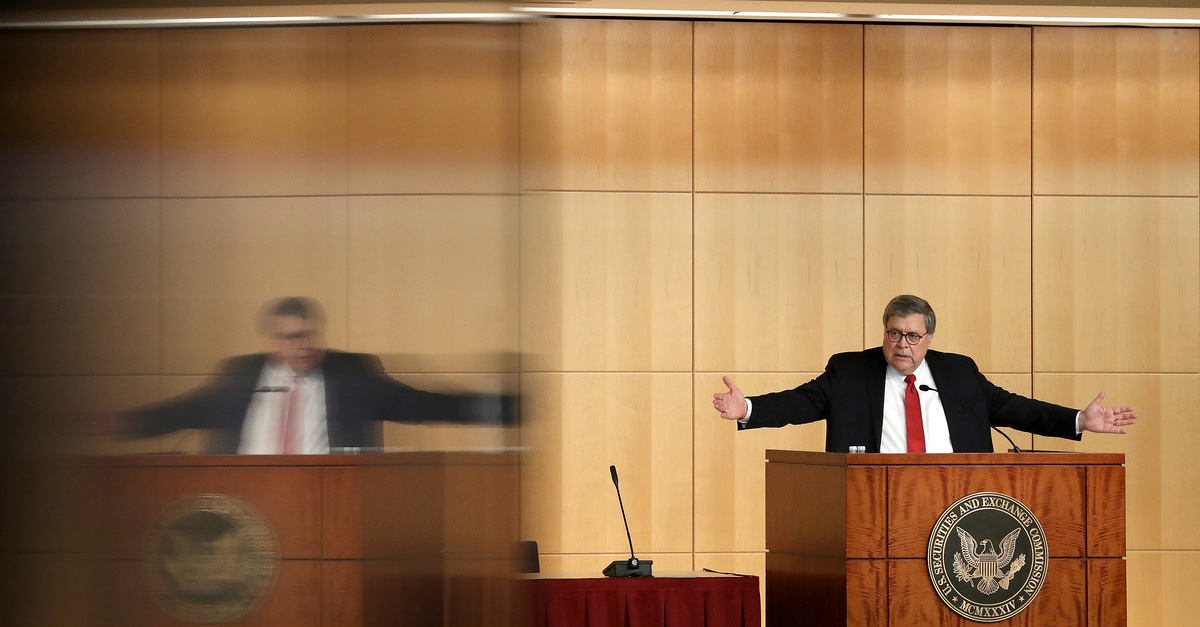
Attorney General William Barr intervened in the construction of the Department of Justice (DOJ) Office of Inspector General (OIG) report on the genesis of the Russia investigation in order to include de-classified information about a well-known British spy. Barr’s out-of-the-blue push for additional transparency is decidedly out of character and being viewed with askance eyes as “highly unusual.”
According to the New York Times, Inspector General Michael Horowitz originally redacted key portions of the OIG report related to former British spy Christopher Steele and the infamous “pee tape” dossier which made several salacious and unverified claims against President Donald Trump.
The OIG report is not expected to portray Steele in a favorable light—perhaps an unsurprising turn given Barr’s 11th hour intervention.
Per that Times report:
The notice to Mr. Steele on the eve of the report’s release was highly unusual. Like the other witnesses interviewed for the inspector general’s report, Mr. Steele had earlier reviewed the findings that are pertinent to him, and he was given a chance to comment on them. In this case, Mr. Horowitz’s office did not detail for him the additional information and gave him no opportunity to respond for the report to be released on Monday.
Steele was apprised of the last-minute change at essentially the last second—on late Sunday—according to an OIG representative. And that’s not quite how things ordinarily work.
“Steele was interviewed extensively by the IG’s office this year and handed over documents,” noted Politico’s Natasha Bertrand. “As is standard, he was able to review the portions of the report that mention him. So it’s unclear why he’s been prevented from reviewing/being briefed on the newly declassified info.”
Said to be included in Horowitz’s report is another internal report conducted by British spy agency MI6 on their former agent. That assessment is believed to paint Steele as a dogged and scrupulous agent who occasionally bucked consensus by chasing down leads and information others deemed of dubious worth. In other words, MI6 viewed Steele as generally honest but sometimes consumed by what his superiors and peers thought were wastes of time.
Steele has long maintained that his salacious dossier was largely a series of leads and suppositions to be chased down and ferreted out—not a finished work of intelligence gathering. Steele’s operating theory is that much of the untoward information contained therein was known to highly-placed Russian intelligence agents who were using alleged, so-called kompromat to blackmail then-candidate Trump.
Two anonymous sources cited by the Times said that Steele will be effectively blindsided by what the full report ultimately reveals.
”Mr. Steele was given no details about the information itself, nor was he told how it would affect the report’s portrayal of him,” the outlet notes.
Grumbles and outrage about Steele’s work and motivations have been a source of politically-effective resentment emanating from the White House and its allies in government and media. This weaponized discord isn’t so much due to the dossier’s as now fizzled-out suggestions but, rather, because of the Federal Bureau of Investigation’s (FBI) own reliance on Steele’s efforts in order to obtain a wiretap on former Trump 2016 foreign policy advisor Carter Page.
An additional and steady series of political dividend-paying complaints from Trump and his inner circle have to do with the genesis of the dossier itself. The document was originally compiled at the behest of Trump’s political rivals during the 2016 GOP primary and later funding came from allies and employees of failed Democratic contender Hillary Clinton and the Democratic National Committee.
While likely to chastise the FBI over their subterfuge as to who paid for the dossier’s initial construction, Horowitz’s report will generally rubbish wholesale claims that Steele’s dossier was the impetus behind the Russia investigation to begin with.
As Law&Crime previously reported, other assorted conspiracy theories as to the FBI’s motivations for investigating Trump’s campaign are also believed to be on the chopping block.
Upon the release of the IG report, Barr released the following statement:
The Inspector General’s report now makes clear that the FBI launched an intrusive investigation of a U.S. presidential campaign on the thinnest of suspicions that, in my view, were insufficient to justify the steps taken.
[image via Chip Somodevilla/Getty Images]